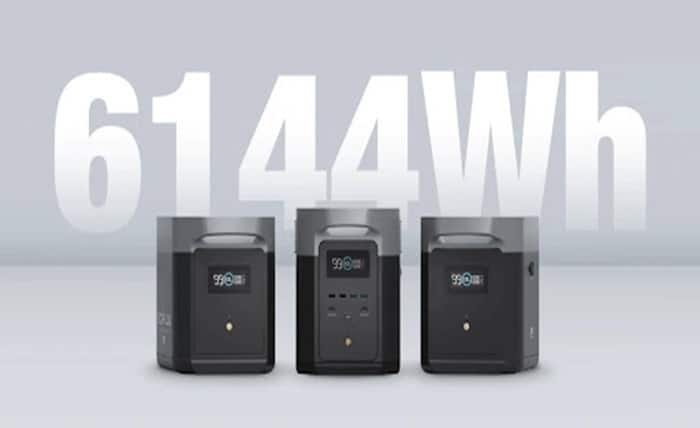Deciding between a portable power station and a traditional generator can be tricky. Each offers unique benefits and limitations. Knowing their differences is key to choosing the right option for your energy needs. This guide breaks down essential features like convenience, power efficiency, and eco-friendliness, helping you select the best solution for your requirements. Whether for outdoor adventures or backup power at home, understanding these options will ensure you make a well-informed and practical decision.
What Sets Portable Power Stations Apart from Generators?
Key Features of Portable Power Stations
Portable power stations, like the EcoFlow DELTA 2 Max, offer an expandable capacity ranging from 2-6kWh, accommodating a range of energy storage needs. They utilize advanced lithium iron phosphate (LFP) batteries, ensuring longevity with 3000+ cycles and up to 10 years of daily use before the capacity drops to 80%.
These units are designed for high output, with the DELTA 2 Max delivering up to 2400W and 3300W in X-Boost mode, capable of powering most household appliances. They provide multiple power output options, including USB ports, AC outlets, and car power outputs, enabling users to charge multiple devices simultaneously. Another significant advantage is their ultra-fast charging capabilities; the DELTA 2 Max can recharge up to 80% in just 43 minutes when using both solar and AC inputs.
Key Features of Traditional Generators
Traditional generators typically run on gasoline, diesel, or propane and are known for their ability to provide consistent and reliable power. They are available in various capacities, suiting small to large power needs. One of their distinguishing features is their robust build, designed to endure harsh environments and prolonged use.
However, they require regular maintenance, such as oil checks and refueling. Traditional generators often include several AC outlets, helping to meet the demands of power-hungry equipment. Despite their sturdiness, they can be loud during operation, producing noise levels that may not be ideal for all settings.
How Do They Compare in Performance and Efficiency?
Power Capacity and Reliability
Portable power stations like the EcoFlow DELTA 2 Max excel in providing a substantial amount of power for short to medium durations, ensuring high reliability with multiple protective layers and BMS (Battery Management System). They are ideal for intermittent use, such as camping trips, outdoor events, and short-term home backup power.
In contrast, traditional generators are renowned for their capacity to deliver continuous power over extended periods. They can efficiently run heavy-duty equipment and are less dependent on frequent recharging intervals. However, they require a steady fuel supply and consistent maintenance, which can add to their operational complexity.
Energy Sources and Cost Efficiency
The EcoFlow DELTA 2 Max utilizes a versatile energy mix, including solar and AC, optimizing cost efficiency, especially with solar recharging. It boasts the ability to recharge from multiple solar panels with high MPPT (Maximum Power Point Tracking) efficiency, making it an excellent choice for reducing long-term energy costs and maximizing renewable energy use.
Traditional generators, powered mainly by fossil fuels, incur ongoing costs related to fuel purchases. While they might offer lower initial costs for high-capacity models, their long-term operational expenses can be higher due to fuel consumption and maintenance requirements. Their dependence on fuel also makes them less adaptable to renewable energy integration.
Are They Environmentally Friendly and Quiet?
Environmental Impact and Emissions
Portable power stations are highly eco-friendly. The EcoFlow DELTA 2 Max, equipped with an LFP battery, ensures reduced environmental impact. When combined with solar panels, it harnesses clean, renewable energy for a sustainable power solution. This makes it an excellent choice for those seeking efficient and environmentally conscious energy options for outdoor or emergency needs.
Traditional generators, mainly running on gasoline or diesel, are known for higher emissions, contributing to air pollution. Even propane generators, despite being cleaner than the former, still emit CO2. Generators’ reliance on fossil fuels makes them less sustainable compared to their portable power station counterparts.
Noise Levels and User Comfort
The EcoFlow DELTA 2 Max ensures ultra-quiet operation at just 30 dB, making it ideal for indoor settings and noise-sensitive environments. Whether at a campsite, in a residential area, or during late-night use, its low noise level ensures minimal disruption while delivering reliable power.
Traditional generators, conversely, generate significant noise, often exceeding 60 dB, which can be disruptive in quiet settings. This drawback can limit their use in areas with noise restrictions and affect user comfort during prolonged use.
Which Is More Practical for Everyday Use?
Portability and Usability
Portable power stations are designed for ease of use and portability. The EcoFlow DELTA 2 Max, for instance, is compact and lightweight, weighing around 23 kg, making it easy to transport. Its plug-and-play design ensures it can be operational in no time, with minimal fuss.
Traditional generators, while sturdy, are often heavier and bulkier, requiring more effort to move. They also demand more setup time, including fueling and priming, dampening their convenience for quick or everyday use.
Maintenance and Longevity
The EcoFlow DELTA 2 Max excels with minimal maintenance needs. Its advanced battery management system optimizes performance and extends lifespan, reducing the hassle of frequent upkeep. This innovative design ensures durability and reliability, making it a smart choice for users seeking a long-lasting, low-maintenance portable power solution.
Traditional generators demand regular upkeep like oil changes, fuel management, and periodic servicing to maintain peak performance. These ongoing maintenance needs can increase the overall effort and cost, making them less practical for casual users.
Conclusion
Choosing between a portable power station and a traditional generator relies heavily on your priorities. If you seek an eco-friendly, quiet, and highly portable solution with minimal maintenance needs, the EcoFlow DELTA 2 Max is your ideal choice. For those requiring consistent, high-power outputs for prolonged periods, traditional generators still hold significant value despite their maintenance and environmental concerns. Assess your specific needs to make the best energy solution choice.

